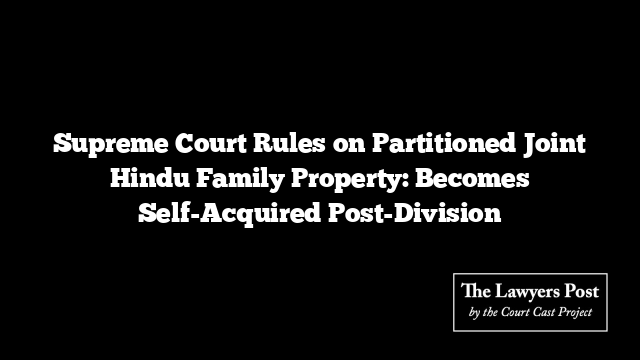In a significant ruling, the Supreme Court recently affirmed that once joint Hindu family property is partitioned, the shares allotted to each co-parcener transition into their self-acquired property, providing them with full rights to sell, transfer, or bequeath it as they see fit.
The case revolved around a dispute following the partition of ancestral property between two brothers, where one of the brothers sold his share to a third party. The Karnataka High Court had initially invalidated the sale, arguing that the property remained ancestral, but the Supreme Court overturned this decision, reinforcing the principles surrounding self-acquired and joint family properties.
The Supreme Court clarified that after the legal partition of joint family property, the distinct shares acquired by each party no longer retain their status as joint family assets. Instead, they are transformed into self-acquired properties, giving the holder full control over them.
In this case, the property in question was purchased by one of the brothers after the partition, using his own funds, and later sold. The plaintiffs argued that the property remained ancestral, as it had been part of the family estate before the division. However, the Court noted that once the property was partitioned, it was no longer part of the joint family property but was indeed self-acquired by the brother who purchased it.
The judgment further elaborated on the principles of property ownership under Hindu law. The Court pointed out that there is no automatic presumption that property remains joint family property simply because the family once held it jointly. Instead, the person asserting that the property is joint must provide proof, especially in cases where the property was acquired with separate funds. In this case, evidence showed that the property was purchased using a loan, reinforcing its status as self-acquired.
This ruling underlines the legal distinction between self-acquired and joint family properties after a partition, ensuring that individuals who receive a share in the partition have absolute rights to that property. The Court dismissed the High Court’s application of the doctrine of “blending” self-acquired property with joint family property, noting that mere acts of kindness or shared usage did not amount to abandonment of separate claims over the property.
With this decision, the Court affirmed the right of individuals to manage and dispose of their share of partitioned property without the constraints of ancestral claims, effectively protecting their ownership rights.





